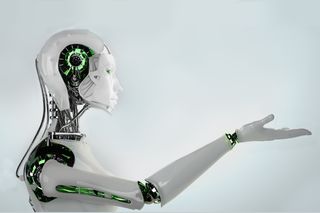Will Android's Andy Rubin help deliver the next big AI innovation?
Rubin's AI incubator, Playground Global, offers start-ups engineering tools

Andy Rubin, the co-founder of Android, wants AI entrepreneurs to use his own engineering facilities via his new start-up incubator, Playground Global.
Playground offers 30 start-ups use of its ready-made engineering department alongside standard funding and advice, working with them to create the "building blocks" of future technologies.
Speaking to Wired, Rubin explained that, eventually, Playground's platform of hardware and software tools will be available to everyone, helping a "generation of entrepreneurs" to build their own smart devices.
"I'm a strong believer in incubating an idea, developing it to a certain point, and then freeing it," he said. "After it's freed, anybody can do whatever they want with it."
In a blog post from earlier this week, Rubin said: "Every 10 to 15 years, the dominant computing platform shifts. We've gone from mainframes to minicomputers to PCs, then to the internet, and we're now smack in the middle of the mobile era. When we ask ourselves what's next, we see devices that sense, compute, and act on information, connected to a cloud that has mature deep-learning capabilities."
Playground's end goal is to create a common infrastructure that can be used across many products, acting in the same way that Android did for smartphones. The project is currently backed by a $300 million venture capital fund including investors such as Google, HP, Foxconn and Redpoint Ventures.
Rubin left his position as head of Google's robotics project in 2014 and launched Playground soon after, and Google has since made its own strides in the AI space. Last month, the company unveiled an AI program created by its DeepMind division sophisticated enough to beat a human expert player at the boardgame Go.
Get the ITPro. daily newsletter
Receive our latest news, industry updates, featured resources and more. Sign up today to receive our FREE report on AI cyber crime & security - newly updated for 2024.
Commenting on the achievement, co-founder and chief executive of DeepMind, Demis Hassabis, said: "While games are the perfect platform for developing and testing AI algorithms quickly and efficiently, ultimately we want to apply these techniques to important real-world problems.
"Because the methods we've used are general-purpose, our hope is that one day they could be extended to help us address some of society's toughest and most pressing problems, from climate modelling to complex disease analysis."
But Google is not the only company working towards the next AI breakthrough, with Apple hiring a number of specialists last year in order to make its voice assistant, Siri, 'smarter' than rivals such as Google Now and Microsoft's Cortana. In January, Facebook's AI engine also came close to beating top Go players.
Peter Barrett, co-founder and CTO of Playground, said: "We want our entrepreneurs to think of graduating Playground the way that we think of graduating Stanford, MIT or Hogwarts.
"We are here for the long haul. We know building a great business takes time. Hands-on guidance and support from the Playground Studio provides an environment where companies flourish and can focus all their intellectual and actual capital on the differences that make a difference."
"It might take 20 years for this vision to come true, but we're starting down the path today," Rubin added. We're training the deep-learning algorithms every time we search Google, upload a photo, or use a speech recognition program... We're aiming big and thinking decades into the future. In the meantime, we're going to make some truly great things."
Caroline has been writing about technology for more than a decade, switching between consumer smart home news and reviews and in-depth B2B industry coverage. In addition to her work for IT Pro and Cloud Pro, she has contributed to a number of titles including Expert Reviews, TechRadar, The Week and many more. She is currently the smart home editor across Future Publishing's homes titles.
You can get in touch with Caroline via email at caroline.preece@futurenet.com.





